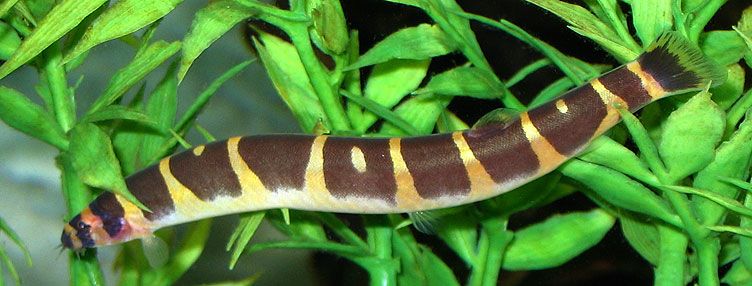Pangio semicincta
Summary

Scientific Name: Pangio semicincta (Fraser - Brunner, 1940)
Common name: Half-Banded Loach.
Synonyms: Acanthophthalmus semicinctus, Pangio semicinctus
Distribution: Indonesia, Malaysia, Singapore
Sexual Dimorphism: Females have smaller fins and males have a thickened second pectoral ray. Females noticeably plumper when loaded with eggs like other Pangio species.
Maximum size: 4 inches (10 cm)
Similar to: Easily confused with other striped kuhlis.
Care: All kuhlis need well-established aquaria and should not be considered for newly set up tanks. Lots of hiding places with soft substrate. Best kept in groups, the larger the better. Three fish is the absolute minimum that should be kept together.
Feeding: Easily fed. Accepts good quality flake, sinking pellets, thawed frozen bloodworm, Mysis Shrimp, brine shrimp, etc.
Water parameters: pH: 6.2-7.0. Hardness: Soft.
Temperature: 78 - 82ºF (25.5 - 28ºC)
Breeding: Probably has been bred in aquaria.

Notes
Markings vary greatly in this species. This Pangio usually has nine to twelve black bars over a deep orange background. There are two or three bars at the head and one or two bars at the tail that circle the body. The rest of the bars tend to be uneven, sometimes connecting to form a solid wedge of black along the back making a saddle pattern. Like all Kuhlis, this species loves planted aquaria with plenty of cover and ideally with some loose leaf litter. In nature, they habitually grub around for food particles in such areas.
Kuhlis are great at getting into awkward places. Undergravel filters are less in vogue these days, but aquarists occasionally stripped down tanks that they had previously kept kuhlis in only to find a population that had obviously bred in the tank hidden beneath the undergravel plate.

Photo Gallery
Click to view all images of this species! |
Document Actions

